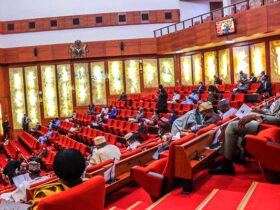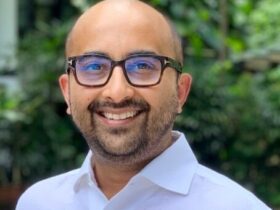Warning from ICAN Boss: Naira Faces Possible Devaluation After 2027 Elections

By Chinedu Adonu
Chidi Ajaegbu, the current President of the Institute of Chartered Accountants of Nigeria (ICAN), has raised concerns about a potential further depreciation of the Nigerian naira, possibly occurring after the 2027 general elections.
Speaking at the inaugural Colloquium/Public Lecture hosted by the Department of Accounting and Finance at Godfrey Okoye University, themed “Harnessing the Capital Market for Catalyzing Infrastructure Development & Economic Transformation in Nigeria: Prospects, Challenges & Roadmaps,” Ajaegbu highlighted the risks associated with Nigeria’s excessive government borrowing, which he believes could deepen the country’s economic challenges.
He cautioned the government to exercise restraint in acquiring loans, many of which have proven difficult to service. Reflecting on the previous administration, Ajaegbu criticized the Buhari government for its imprudent borrowing practices.
“Heavy borrowing deters investors. The government must be judicious in taking loans. The Buhari era was marked by reckless borrowing,” he remarked, warning that such fiscal irresponsibility could trigger a devaluation of the naira, which has remained relatively stable in recent months.
Predicting economic turbulence post-2027, Ajaegbu, who also serves as CEO of Heritage Capital Market Ltd, stated, “Shortly after the 2027 elections, the naira might face devaluation. Although it has been stable over the past five to six months, this stability may not last beyond the election period.”
He further lamented the country’s persistent issues such as slow infrastructural development, an expanding population, and aging facilities, emphasizing that failure to address these problems could push Nigeria into a prolonged economic slump.
Additionally, Ajaegbu expressed concerns about the economic outlook of the United States, noting that despite appearances, the country is edging toward financial instability. He pointed out that the U.S. is unable to sustain a Sovereign Wealth Fund, unlike nations such as Norway and Saudi Arabia, which currently maintain such funds for their citizens.
“The U.S. is effectively insolvent, though this is not openly acknowledged. It consumes more than it produces,” he explained.
He also advised caution regarding World Bank loans, arguing that these often come with hidden costs, including the mandatory engagement of consultants who take a significant portion of the funds, thereby economically encumbering the nation.
To foster sustainable economic progress, Ajaegbu recommended leveraging the stock market as a vital funding source. “Advancement depends on raising capital through the stock market, but this requires accountability and a robust judiciary to prevent corruption from undermining investor confidence,” he asserted.
Prof. Christian Anike, Vice Chancellor of Godfrey Okoye University, emphasized that the lecture aimed to bridge theoretical knowledge with real-world applications for students, urging both students and faculty to engage attentively with the discussions and insights shared.
Hon. Uche Ugwu, Speaker of the Enugu State House of Assembly and chairman of the event, underscored the critical role of the capital market in fostering business growth and enhancing infrastructure development within communities.
Delivering the keynote address via Zoom, Prof. Uche Uwaleke, President of the Capital Market Academics of Nigeria (CMAN), stressed the need to improve capital market literacy, particularly in the South East region, to empower individuals to make informed investment decisions and boost economic prosperity. He expressed optimism that the colloquium would generate actionable solutions.
“Capital market awareness remains low in Nigeria, especially in the South East. The outcomes of this colloquium will significantly enhance understanding and participation in the capital market within this region,” he said.
“I envision a future where many from the South East actively engage in the capital market. Economic development hinges on long-term financing, which the capital market facilitates. Given the industrious nature of people from this region, embracing the capital market will benefit both individuals and government entities.”
Prof. Uwaleke also pledged support from CMAN to Godfrey Okoye University’s efforts in promoting capital market education in the South East.
Earlier, Dr. John Odo, Head of the Accounting and Finance Department at Godfrey Okoye University, highlighted the capital market’s pivotal role in stimulating economic growth by mobilizing savings, managing risks, and funding business expansion.
“Governments at all levels have recently intensified efforts to boost the economy and increase internally generated revenue to withstand global economic challenges. The capital market is a crucial mechanism for channeling investor savings and facilitating efficient resource allocation,” he explained.
Prof. Uche Lucy Onyekwelu, chairperson of the Public Lecture Organizing Committee, affirmed that Nigeria’s economic ambitions could be realized through effective utilization of the capital market.
“Nigeria is steadily progressing toward a stronger economic future through sound policies, fiscal reforms, infrastructure renewal, and commitment to the Sustainable Development Goals (SDGs). The capital market remains essential for promoting transparency, investor confidence, and market efficiency,” she stated.
Onyekwelu also noted the underrepresentation of South East-based companies on the Nigerian Stock Exchange, attributing this to limited awareness and reliance on sole proprietorship funding models, which restrict access to long-term capital and threaten business sustainability.
“Only about two to three companies from the South East are listed among the 151 on the Nigerian Stock Exchange, which is far from ideal. Increasing capital market participation in this region is crucial for economic growth and business longevity,” she concluded.








Leave a Reply